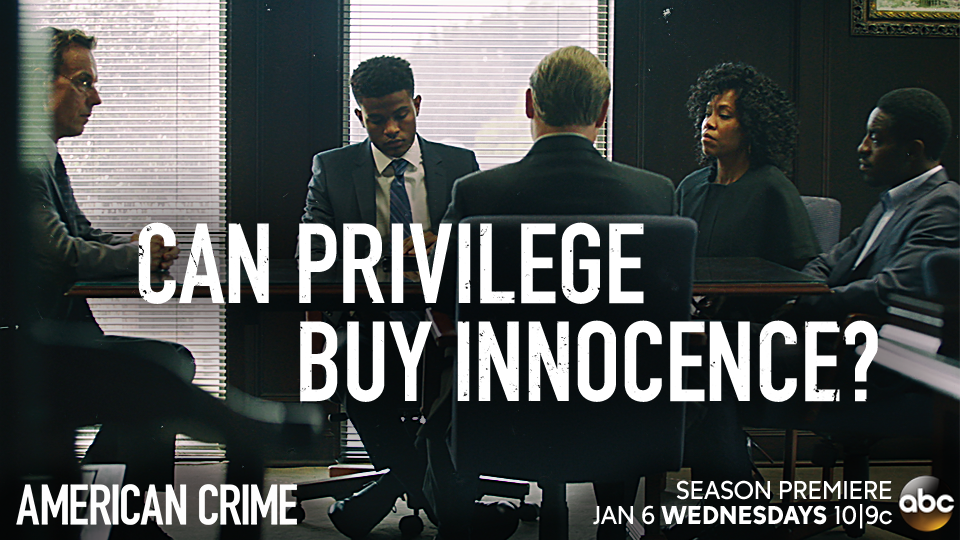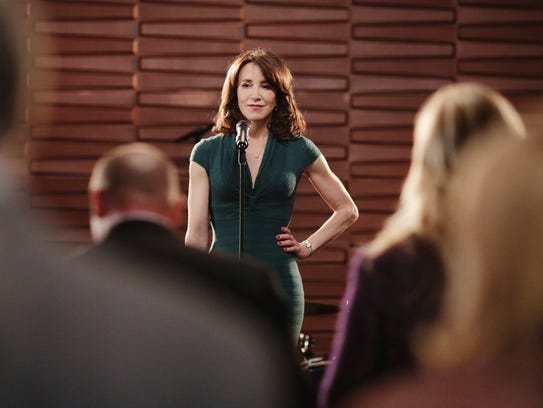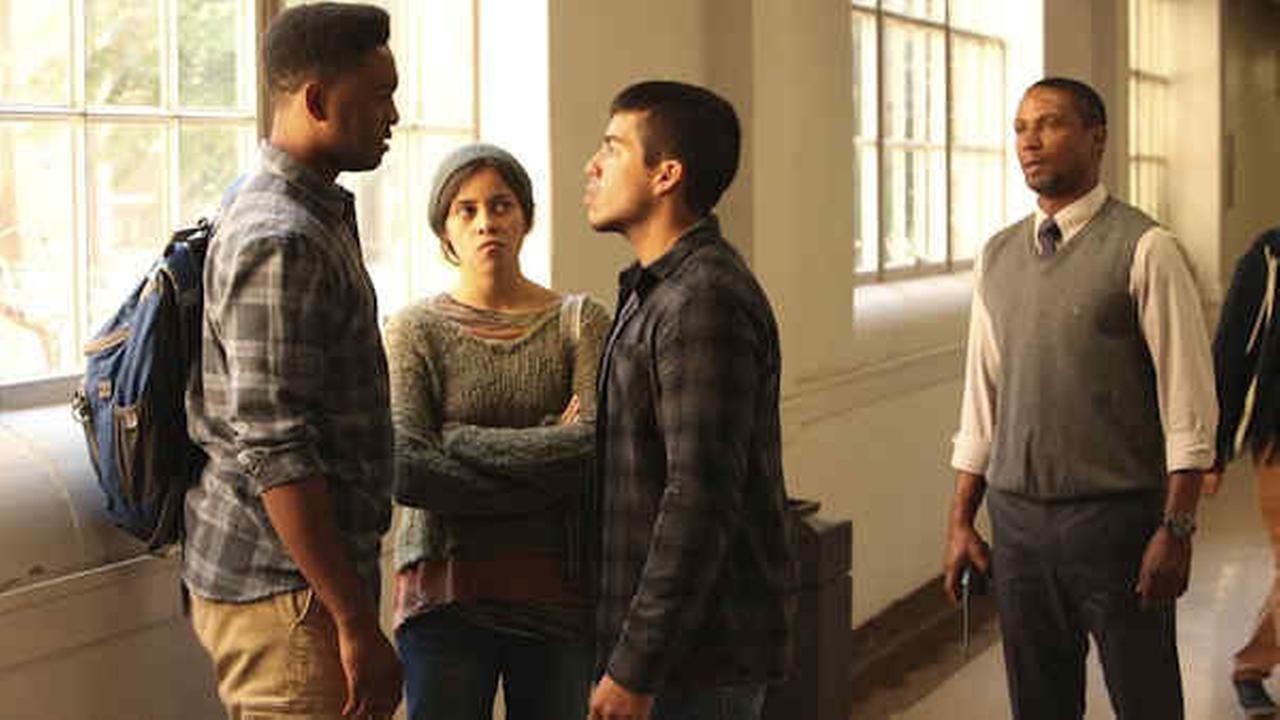 |
| Please let there be aliens... please let there be aliens... |
Arsenic Pie: SLUTS ASSEMBLE
Maggie Cats: WOOHOO. That's
the secret; we're always slutty.
Clovis: Slutty, slutty
assembling.
AP: But we are not always
assembled and not always slutty in the same place in time and space. Who would
like to begin? BECAUSE OMG
MC: General thoughts?
C: So much racism! So much
sexism!
AP: It was, much like the
case itself, a train wreck. In that I could not look away.
MC: I remember when the trial
was happening, I think I was...14? But most of the broader cultural implications
were completely lost on me.
AP: Also: Kato!! What what
what was he on?
C: Kato was criminally (see
what I did there?) underused.
AP: I see what you did, and I
appreciate it.
MC: That pun was a crime.
AP: Yeah, I remember it all
happening, but I also paid zero attention to it. If punning you is wrong, I
don't want to be right!
C: I remember classes in my
high school shutting down so that we could watch the verdict being delivered.
Even in small town lily-white MI, it was a thing.
MC: I think the main things I
took away from the show was how ridiculously underprepared the prosecution was
for the defense's strategy and how Marcia Clark was eviscerated in the media.
Basically for being a woman. That enraged me.
 |
| Marcia, Marcia, Marcia! |
AP: Well, that hairdo was
pretty bad. I had no idea she was a rape victim.
MC: Me neither! I wonder if
that came out in the book she wrote after the trial.
AP: And I also didn't
remember/know that a tabloid published a nekked photo of her. Because what do
you do when there's a lady lawyer? You slut shame her OBVS.
C: Duh. Ladies practicing
law? Pshaw! Who ever heard of such a thing?
AP: Next you'll tell me they
let the womenfolk do the doctorin’. That just ain't natural.
MC: Seriously. It kind of
opened my eyes to the progress we have made even in the last few decades. Though
stuff like this still happens, but nowadays I think there would be backlash.
C: I was really glad to see
how they treated Marcia Clark as a character. Which is to say, I thought they
showed really well that she was always in a
damned-if-she-does-damned-if-she-doesn't place.
MC: I absolutely agree. Any
character with Kiss From a Rose as
their theme song is OK by me.
C: Oh Man, we need to talk
about the wondrous ‘90s music employed in this show.
AP: I was also interested in
the way they portrayed her. They showed her as someone who was really trying to
do her job and get at the truth, and not as a famewhore. Who was Johnnie
Cochran. Who is the biggest famewhore in the history of famewhores BT Dubs. And
that actor’s portrayal was spot on.
 |
| Real life v. Hollywood. Brother from another mother? |
MC: Absolutely. She did an
impossible job AND was in the middle of a custody battle. That's brutal.
C: Agreed, but I also liked
that Johnnie Cochran was a complex character himself. Like, he was a total
famewhore, but one who did have a very clear guiding principle that wasn't just
around his own self-aggrandizement. (Though, that obviously was a factor as
well.)
MC: The guy who played
Cochran [Courtney B. Vance] has been in a lot of Law & Orders and is always
great. I was psyched when I saw he was playing that role.
AP: I remember when I started
watching it, I looked up who was playing Cochran because he nailed it. He
was really the stand-out for me, acting-wise.
C: Totally. I had to keep
reminding myself that he wasn't actually Johnnie Cochran. And on the other end
of the spectrum WTF John Travolta?
AP: I know, right! Oh, he was
baaaaaad.
MC: OMG that was so weird! Sarah
Paulson for me was the real stand out.
AP: Yes, she was excellent.
MC: Was Travolta supposed to
be bad though? Like, was that the character? He was just so swarmy.
C: It was like watching a demented
sad clown trying to be a lawyer. Krusty would have been a better choice.
AP: I am so over Travolta. And
was he wearing a bad make-up job or is that is face now?
MC: He is plastic fantastic. I
actually thought he was fabulous as that character; but that's because we
aren't supposed to like that guy either.
AP: It was a departure for
him, but I can't say I'm a fan of his acting. Just kind of chewed the scenery a
bit. It was a bit too much.
 |
| Pennywise wasn't this disturbing. |
MC: CAN WE PLEASE TALK ABOUT
DAVID SCHWIMMER? He was great.
AP: YES! YES WE CAN BECAUSE
HOLY SHIT ROSS IS ROBERT KARDASHIAN!
MC: "Juice...Juice..."
It was crazy. So basically OJ Simpson is responsible for the Kardashians.
THANKS,OJ.
AP: And that is why OJ is
currently in prison. He *was* good, I have to say. But I was always distracted
by his skunk hair.
MC: That's what that guy's
hair looked like though!
AP: No wonder Kris cheated.
C: What did you guys think of
the decision to incorporate the Kardashians into the story? Obviously, they're
trying to say something about what fame does to people.
MC: I had read the
showrunners were specifically setting out to show the cultural impact of the
trial. Example: Kato.
C: And the Kardashians are
obviously one of the biggest components of that.
 |
| Next season on American Horror Story... |
AP: I thought the scene with
the little Kardashians was good foreshadowing. Like, you could see Little Kim
plotting to become famous somehow. Overall, you could see that the show was
addressing the cultural shift.
MC: It certainly did not
paint a flattering portrait of most of the LA rich people.
AP: It was kind of the first
time there was wall-to-wall coverage of a murder case, and it wasn't because
people were interested in it legally or wanted to see justice done, they just
wanted to be entertained, and the media complied.
C: Agreed. It seems to me that the big takeaways the show wanted us to,
well, take away were the danger in obsession with fame, the problem with
putting justice essentially to a public vote, and the very real and very much
still pervasive mistreatment of minorities by white people in power.
MC: Absolutely. The whole
thing had a "last days of Rome" feel to it.
AP: It was bread and circuses
all the way.
MC: Everyone had a stake and
an opinion on it. It was like a perfect storm with the race issues, celebrity,
and salaciousness. Fo sho
C: I mean, Chris Darden's
last speech to Johnnie Cochran even lays it out when he says "[the police]
are still going to keep right on killing us." They may as well have had a
flash forward to a Black Lives Matter march.
AP: And don't forget the
domestic violence angle. Because yes, the cops were racist. And yes, Mark
Furhrman is kind of a Nazi. But that doesn't take away from the fact that OJ
beat and terrorized Nicole.
MC: Since I didn't follow the
actual case closely as a kid, a lot of the facts of the crime were a surprise
to me. Like how the LAPD failed at every possible step of the way. The prior
beatings and abuse were a shock to me as well. It was so awful.
AP: They completely
failed. That was one part of the case I knew about. I knew about that and
the glove, and that was about it.
MC: I think the show also
worked to keep the focus on the victims, something the trial was not able to
do. Like, "hello? Remember the people who were brutally murdered?"
C: But weirdly, we never saw
the victims. Which, for a Ryan Murphy show, I was really surprised by given
that he never met a bloody body scene he didn’t love to film. We see flashes of
two bodies in the first episode, but never their faces. It’s not until the show
ends that we even see any representation of Nicole Simpson and Ron Goldman.
AP: I actually thought that
was a good choice. It was respectful to the victims not to cast them as Body 1
and Body 2. It was better to just let the real victims be...the victims.
C: It seemed to me like the
show was trying to make a point about how much the actual victims were left
behind in this process.
MC: Totally agree. This was
actually the strongest Ryan Murphy show I have seen. I think because it was
limited run, completely mapped out in advance, and based on real events. Keeping
the Dad and sister of Ron (I think?) front and center was smart.
C: Yeah, because he was bound
by facts and couldn't throw in aliens in episode 6. Just for funsies.
AP: True or False: Aliens
would have made it that much more intriguing.
C: I maintain that John
Travolta was playing his character as an alien. It's the only thing that makes
sense to me.
MC: False. Truth is stranger
than fiction. Also, Hahahaha, word.
AP: I think we may have a
solid theory going. I mean, Homeboy is a Scientologist. I'm sure he thought
aliens factored into it somehow.
MC: Oh, lord.
C: "Aliens did it"
would actually probably make a more believable defense strategy than the one
they actually presented.
AP: "If I Did It,"
by OJ Simpson.
 |
| Please note that this is an actual book. |
MC: So, I have to ask. Do you
guys think he did it? I have never expressed an opinion because I never thought
I knew enough of the facts.
AP: I still don't think I
know enough of the facts, to really say for sure. I would say he probably did
it, but I also wonder if there wasn't someone else involved.
C: I think, based only on
what I know from reading, that yes he definitely did it.
MC: How about this: do you
think OJ believes it was someone else? The way he was portrayed it was like he
honestly didn't know why he was there.
AP: Yes. That I believe. He
might have done it in a fit of rage, and then honestly blacked out.
C: I think OJ probably
doesn't have a realistic impression of his own mind. Which is to say, I think
he knows he did it, but in his head the reasoning for it is so constructed and
explained away and rationalized that he effectively believes that he did not do
something he did.
MC: I would believe that; or
convinced himself he blacked out. Right--and justified. Since Nicole was
"his." It was creepy how he always called her "my Nicole."
C: That's what makes his
whole case fascinating in my mind: I think he's pretty clearly the killer, but
the case lived and died on the very real issue of institutionalized racism.
AP: And he really got off
because the cops were so incompetent.
MC: It was like, the jury let
this one black man go who actually committed it in response to all the black
men who were convicted and innocent. And, to be fair, that is a legit reason to
get off.
C: For me, the show hit it
best in the last episode in a scene between Johnnie and his wife. His wife
effectively says that OJ very likely did the crime that he was accused of, but
the reason why she's proud of Johnnie is because he shined a light on how
terribly African Americans are treated by the police in this country. Even if
OJ didn’t deserve to go free, the attention his case brought was still a good
thing. The case was an imperfect one, but the issue it raised is one that needs
to be talked about, basically.
 |
| Justice, LAPD-style. |
MC: Our justice system is
designed around the idea it is better to let 10 guilty men free rather than
imprison one innocent man.
AP: Or the jury may have
believed the defense. They might have actually thought that they knew what cops
were like, and in their minds, it's totally reasonable for cops to plant
evidence.
MC: Which we all know is now
how things go down. I totally agree with Clovis. And like we noted, the police
fucked this up royally.
C: I don't believe that the jury
"threw" the case, for lack of a better word. I'm pretty convinced
that the jury members honestly believed that he did not commit the murders.
AP: No, I don't think they
threw it either. I think they honestly thought the cops planted evidence. Because
the jury was comprised of African-Americans, and cops have planted things on
African Americans.
MC: Well, you don't have to
believe he was innocent. You just have to have reasonable doubt. I'm not sure I
would have convicted. Even if I believe he did it. Reasonable doubt is not that
high a bar.
C: Exactly. They had enough
experience with the LAPD to easily believe the police were corrupt and that it
wasn't beyond reasonable doubt that they could have framed OJ. Hence,
acquittal.
MC: The defense definitely
called a lot of the evidence into question; and remember, this was basically
the first high profile use of DNA. There was no CSI. People were like, whaaaaa?
C: Also it shows how you have
to be careful telling a story, right? "Please listen to this long, droning
explanation of science" isn't as compelling for people as "these
racist corrupt cops tried to pull a fast one on you."
MC: Exactly. The show did a
good job of showing how the jury was totally not getting it--nobody wants to
hear 3 days of some scientist blabbering on.
AP: No, if it's not in
layman's terms, nobody is going to care.
C: So what do we think were the
things the show did best?
AP: THE CAR CHASE. With OJ
and the gun and the screaming = Hilarious. You can't make this shit up.
That's why it's so good.
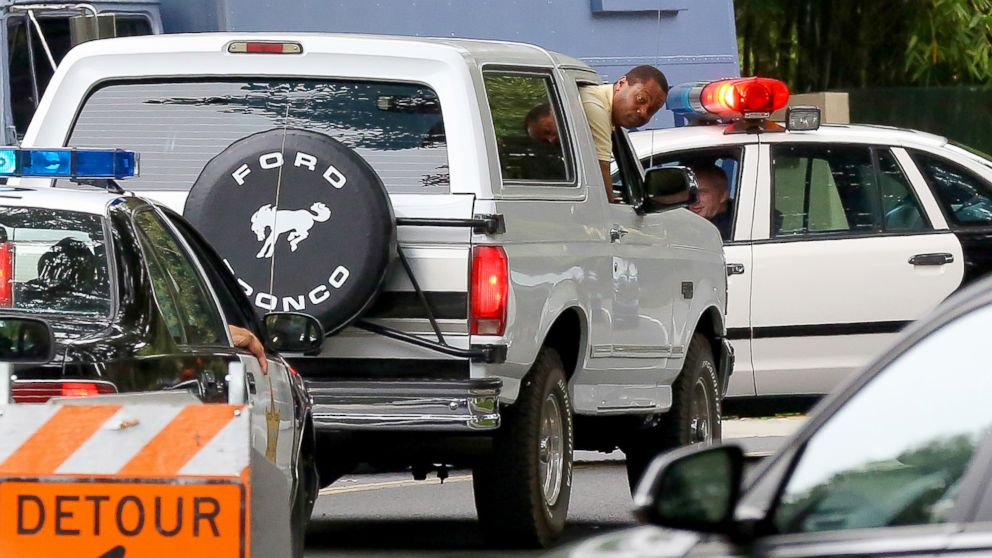 |
| Traffic on the 405 this morning: Light with a few backups due to fugitive activity. Normal Tuesday, folks! |
MC: It definitely told a
compelling story. And I thought was pretty honest while still being dramatic.
AP: The script was
compelling, and the cast was committed.
C: I thought they did a
really good job of taking a period piece and connecting it subtly but solidly
with issues that we're seeing today. And that it didn't have the usual Ryan
Murphy hallmarks of weird shit happening just for fuck's sake.
MC: For sure; I was
pleasantly surprised by the quality of everything. But it still felt soapy
enough that it was entertaining.
AP: It was really quite
addictive. Nobody was phoning it in, except Travolta, who was coming to us live
via satellite from his auditing center.
MC: He was with his alien
overlords so distracted.
C: Travolta's thetans really
deserve an Emmy nod for this one.
AP: And he'll have to donate
half his Emmy to the church. And Lord Xenu. And Tom Cruise
C: IT'S CALLED TITHING AND
HOW ELSE ARE YOU GOING TO GO CLEAR WITHOUT IT?!?
MC: Don't forget Nathan Lane.
So random! The casting in this was so weird and so awesome.
C: How much fun did Nathan
Lane have playing an uber straight dude? I mean, really?
AP: I loved Nathan Lane. He
was basically playing Ken Starr.
MC: But David Schwimmer
definitely wins for most random. And great. But I thought he only directed
stuff now. He hasn't been in anything for a while. It was a great role too--I
found his whole arc about doubting OJ's innocence and struggling with that
really compelling. What would you do if you believed your best friend murdered
someone? I mean, we're all cool with it because TV Sluts united forever. But it
must be hard for normal people.
C: We're going to be blogging
from prison, let's face it.
AP: They let you have
internet time in Gitmo, right?
MC: I bet Arsenic Pie goes
first. She'll get put in the slammer for speeding tickets and they'll ignore
all the real crimes you've committed.
AP: FOR THE LAST TIME,
PUNNING IS NOT A CRIME! You know I'm going to bust some kittens out of a
university science lab and it'll be the big house for AP.
MC: 20 to life, bitch. You'll
get your comeuppance.
AP: Fortunately, I learned to
fashion a shiv from watching Downton
Abbey. Anyway, back to it, OJ didn't seem like OJ, casting-wise. He's
supposed to be a pro football player, right? Why was the actor they cast so
fucking tiny?
MC: Well, he HAD been. He was
retired at that point.
AP: Right, but he didn't shrink.
He was physically too small for the role.
MC: It's pretty common for
pro athletes to gain a lot of weight after they stop playing.
C: I thought Cuba Gooding Jr
did a good job, but agreed that he never quite nailed OJ. Like, he just didn't
quite become the part the way Courtney B Vance did for Johnnie Cochran or Sarah
Paulson did for Marcia Clark.
MC: I actually think is a
good thing to talk about--because the show didn't seem to want to take a stance
on whether OJ knew he did it or not. So I don't know how much Cuba was given. It's
hard to walk that line.
AP: He did a good job being
Cuba Gooding Jr. He didn't seem physically imposing at all is my point.
MC: The first few episodes of
showing how he could get very unbalanced. I would have like to have seen him
rage out.
AP: He didn't go all the way
into how scary OJ supposedly could be.
 |
| Unclear if this is a compliment to OJ Simpson or an insult to Cuba Gooding Jr. |
C: Maybe the reason for that
is because the show was trying to be agnostic about his guilt or innocence. I
mean, it's notable that we never once see any kind of recreation of the night
in question, which would have been easy enough to film.
MC: Agreed. The audience is
definitely supposed to make up their own mind. So it's difficult for an actor
to play that role when the story never specifically tells him whether he did or
not. He has to be convincing both ways.
C: And that fits with the
idea that the show really isn't that interested in OJ himself, it's interested
in the questions raised by the case (and trial) and what the cultural fallout
from it was.
MC: BOOM. NAILED IT.
C: Thanks. I am incredible,
aren't I?
MC: It's this kind of hard
hitting analysis people expect from us. Also poop jokes.
AP: And Scientology jokes. Cuba
did a fine job acting-wise. He just seemed kinda there. Like, he's not as
tall as OJ, and not as muscular, and he didn't have that same
physicality. Which, even if the focus isn't on OJ, OJ should still have
been more of an elephant in the room. He just wasn't.
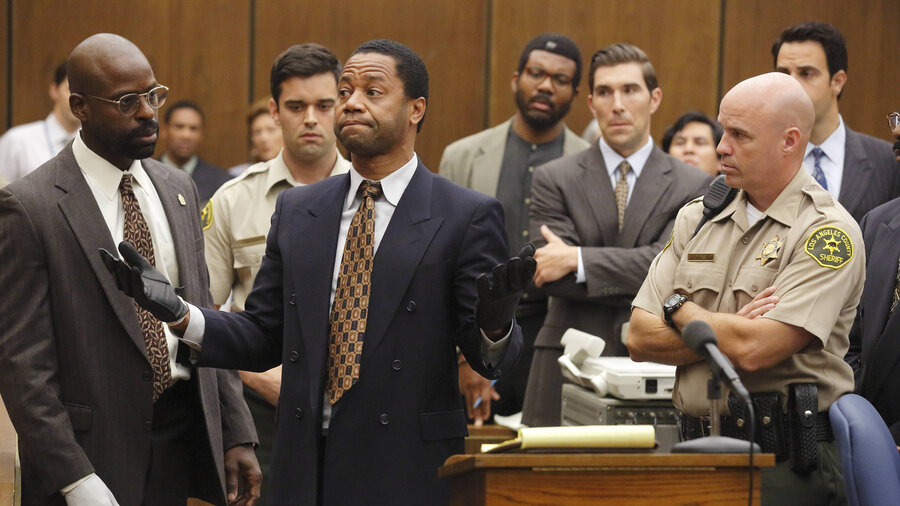 |
| "Yes, you, young man. Would you mind trying on the gloves of this famous football player?" |
MC: Yeah, agreed. The 8
previous calls to the police for domestic abuse is kind of a hard fact to
ignore. The whole thing is just awful. Everyone failed Nicole in this
circumstance.
C: The thing that was probably
most heart-breaking to me was the scene of the Goldman family silently walking
back to their car, hearing the news reports of people celebrating throughout
the city and then asking "what do we do now?"
MC: Absolutely.
AP: You sue. That’s what you
do.
C: Which has always been the
thing that brings me back to the guilt or innocence question when you think
about OJ. If he didn't do, someone did and that someone has never been pursued. Of
course, the reason why is because the LA DA honestly believes that they found
the killer and there's no one else to pursue, but hey. Double Jeopardy,
everyone!
MC: But then when we say
things like that, I want to roll my eyes and be like, of course we know who did
it. Which kind of throws my whole "I haven't made up my mind yet' thing
out the window.
AP: The defense did do a good
job of pointing that out. That no other suspects were ever considered.
MC: Any final thoughts?
C: I'm interested to see what
next season is. This is an anthology series, after all.
AP: I would like to see them
do the Steven Avery case, actually
MC: Charles Manson? Lizzy
Borden? Good stuff about women in there.
AP: Nothing will top
Christina Ricci though. The Christina
Ricci one was such a hot mess!!
C: I would love a season
focused on the Chicago Murder Castle and the World's Fair. (Devil in the White
City stuff.)
MC: As long as they focus on
the murders and not the architecture. Zzzzzzzz
AP: I think this is a good
series. So long as they keep attracting high caliber actors.
C: That's the real benefit of
an anthology. You can get really good, big names because they don't have to
sign away seven years of their lives. It's basically just shooting a big movie
and then they can come back next season if they want to.
AP: Yeah, not too shabby to
get Bruce Greenwood on board. I have a crush on him.
C: Didn't he play Captain
Pike in the NuTrek movies?
AP: YES!
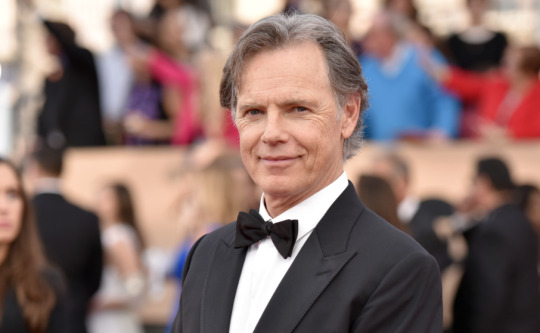 |
| Dreamy |
MC: I have a crush on David
Schwimmer now.
AP: I'm telling Rachel you
put moves on her man. I'll hold her down and shave her head.
C: It's hard to come back
from Rachel. She did a number on all of us in the 90s.
MC: Yeah, Greenwood was great
as the DA! He's very handsome. Though he seems short.
AP: He's 5'11"
MC: Someone has IMDB open.
AP: LIKE A BOSS. Anyway, overall,
very good. Very compelling. A couple casting hiccups, but really well done
MC: I think it's fair to say
we all enjoyed the hell out of the show. Both as entertainment and for raising
conversations about broader issues. It certainly is a huge flashpoint in
American history.
C: Yes. TV Sluts agreement.
MC: TV Sluts hooooooooo!

